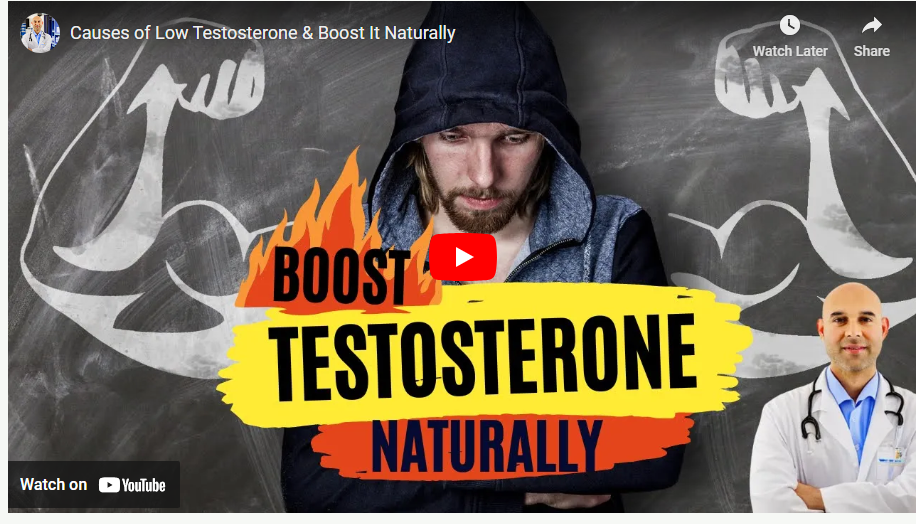How to Naturally Boost Your Testosterone Levels?
Hey everyone, Pankaj Saluja here, a pharmacist with a passion for natural remedies and health optimization. In today’s video, we’re delving into the fascinating world of testosterone. Often dubbed the ‘male hormone,’ testosterone is crucial for both men and women, affecting everything from energy levels to libido. Let’s gain a deeper understanding of its role in our bodies and explore ways to naturally boost testosterone levels.
Watch the Full Video
Before we dive in, check out my video where I discuss how to naturally boost your testosterone levels and explain its vital role in our health. Watch it for a comprehensive overview https://youtu.be/ESHtcFxkOcI?si=8JwCTr13uKEyursU
What is Testosterone?
Testosterone is a hormone produced primarily in the testicles in men and the ovaries in women, with smaller amounts also made in the adrenal glands. It plays a crucial role in the development of male reproductive tissues and is key for libido and sperm production. Additionally, it promotes secondary sexual characteristics such as increased muscle mass, bone density, and body hair growth.
In women, testosterone contributes to muscle strength, bone density, mood regulation, and sex drive, although in much lower amounts compared to men. Adequate testosterone levels in women contribute to overall vitality and well-being.
Symptoms of Low Testosterone
In Men:
- Low energy and fatigue
- Decreased muscle mass and strength
- Erectile dysfunction and reduced libido
- Mood swings and irritability
- Difficulty concentrating
In Women:
- Reduced muscle mass
- Decreased libido
- Mood changes
- Vaginal dryness
- Difficulty sleeping
Natural Ways to Boost Testosterone Levels
There are several evidence-based strategies you can incorporate into your lifestyle to stimulate testosterone production:
1. Engage in Resistance Training and HIIT

Physical activity, especially resistance training and high-intensity interval training (HIIT), can significantly boost testosterone levels.
2. Consume Adequate Protein

Aim for enough protein to support muscle growth and repair. Think lean meats, chicken, fish, eggs, beans, lentils, and tofu.
3. Include Healthy Fats
Healthy fats found in avocados, nuts, seeds, olive oil, and fatty fish like salmon and tuna are essential for hormone production and overall health.
4. Eat Plenty of Vegetables
Vegetables like broccoli, spinach, kale, and cauliflower are loaded with vitamins, minerals, and antioxidants that can support testosterone levels.
5. Ensure Sufficient Zinc Intake
Zinc is crucial for testosterone production. Include foods like chickpeas, pumpkin seeds, oysters, or lean red meat in your diet.
6. Get Enough Vitamin D

Vitamin D plays a key role in testosterone production. Sunlight is your best source, but consider supplements if needed.
7. Prioritize Quality Sleep
Adequate sleep supports hormone regulation and production. Aim for 7-9 hours of quality sleep per night.
8. Manage Stress
Cortisol can inhibit testosterone production, so practice stress-reducing techniques such as meditation, deep breathing exercises, or yoga to lower cortisol levels.
9. Maintain a Healthy Weight
Excess body fat, especially around the abdomen, can lead to lower testosterone levels. Aim for a balanced diet and regular exercise.
10. Reduce Sugar Intake
Excessive sugar intake can disrupt your hormones and potentially lower testosterone levels.
11. Stay Hydrated
Drinking plenty of water throughout the day is important for overall health and may indirectly support healthy testosterone levels.
12. Limit Alcohol Consumption
Excessive alcohol consumption can lower testosterone levels. Opt for mocktails sometimes, and your hormones will thank you.
Want to Know More About Boosting Testosterone?
Curious to learn more about how these lifestyle changes can help boost your testosterone levels naturally? Watch my detailed breakdown in the video https://youtu.be/ESHtcFxkOcI?si=8JwCTr13uKEyursU
Lifestyle Factors Affecting Testosterone
Certain lifestyle factors can influence testosterone levels:
- Lack of physical activity and prolonged sitting can contribute to lower testosterone levels.
- Inadequate or disrupted sleep can disrupt hormone production and regulation.
- Diets high in processed foods, sugar, and unhealthy fats can negatively impact testosterone levels.
- Certain chemicals found in plastics, pesticides, and personal care products can interfere with hormone balance and testosterone production.
Conclusion
Testosterone is a crucial hormone for both men and women’s health, influencing various aspects of vitality and well-being. By adopting healthy lifestyle habits such as regular exercise, a balanced diet, adequate sleep, and stress management, you can naturally support optimal testosterone levels and promote overall health. It’s essential to listen to your body and always consult a healthcare professional for personalized guidance.
If you have any questions or have tried any of these tips, drop a comment below. And don’t forget to watch the full video for a more detailed discussion!


